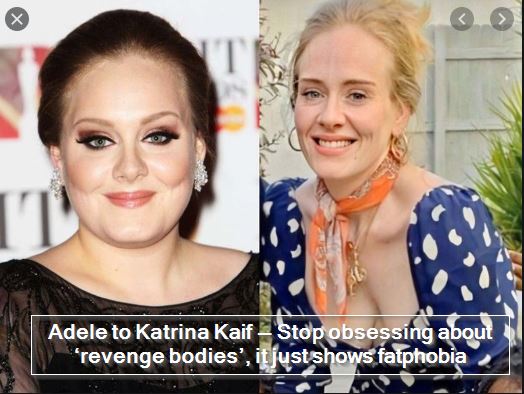Adele to Katrina Kaif — Stop obsessing about ‘revenge bodies’, it just shows fatphobia
When singer Adele posted a picture of herself on Instagram on her birthday, little would she have known that her fans would only praise her weight-loss.
uess what the big news of the week is — a singer has lost weight and people cannot stop celebrating it on social media. Adele, a 15-time Grammy award winner, recently posted a photograph on Instagram on her birthday. But fans and internet stalkers only chose to see her weight loss and congratulated her on the ‘glow up’ and her ‘revenge body’.
What is a ‘revenge body’? It’s a trend of getting into shape and losing weight for the ‘perfect body’ And for what? To get back at your ex.
US reality star Khloe Kardashian brought this concept back into focus with her show Revenge Body, where fitness trainers and nutritionists help people achieve a ‘flawless’ figure through a gruelling regime. While Kardashian herself has clarified that the show is not about body-shaming people, that’s not the message audiences are taking back. And the trend is rearing its head in India too. Way back in 2016, GQ magazine had already put Kareena Kapoor and Katrina Kaif in their list of ‘top revenge bodies’.
On ‘perfect’ measurements
The fact that a woman’s self-worth is directly proportional to certain measurements is not new. Society has always favoured women with a certain body type, with beauty being a consequence of said proportions. If you were not hourglass, you were not desirable. Not only are they seen as less beautiful, but women who are heavier are also seen as unhealthy, lazy and even unintelligent.
The idea of a revenge body is premised deep within this cesspool of body-shaming. It basically says that you had a partner who did not appreciate you, so the best thing you can do is to change yourself completely because your old self was perhaps not worth being loved or desired. What’s more? You will now inhabit a body that this ex-partner would have appreciated.
[amazon box=”B07NCRLGYH” “small”]
Relationships end for a variety of reasons, but the idea that you need to change your physical appearance belies the fact there may be any number of things that could have gone wrong. According to health coach Beth Clayton, “Whenever we are using our bodies as a currency for love or validation, or to prove our own worth to ourselves, we are playing a game that will never end with our winning.”
Unfortunately, women are also complicit in this. A lot of these ideas of ‘bettering’ oneself through diet regimens are propagated by women in the name of self-care. But there is inherent toxicity here because the very term ‘revenge body’ implies that what you are doing is to show someone else.
“We are making decisions out of fear of not being enough rather than genuine desire to be loving toward our bodies and ourselves,” states Clayton. Women too, after all, are products of patriarchy.
Love thyself, but within certain parameters
We’ve all grown up with seemingly innocuous comments like ‘have you put on weight?’, ‘looking plump there’, ‘you sure this dress is for you’, ‘watch your weight, girl’. No girl, you watch your mouth, it is high time these unsolicited comments stopped because no one wants to hear them and they are definitely not advice.
And it made no difference to Adele’s songs, popularity, awards, lyrics, what you thought of her weight.
Even actors are not spared. Jennifer Aniston is a classic example of someone who is praised for her ‘revenge body’ after splitting from actor Brad Pitt in 2005 and singer John Mayer in 2008. Closer home, when Katrina Kaif split from resident playboy Ranbir Kapoor, according to Elle, her“defined abs and the sudden sharpness in her style quotient was noticed by everyone”. Not exactly sure what was wrong with her style quotient prior to the breakup but hey, let’s credit Kapoor for whatever she did.
Actors like Sara Ali Khan and Sonakshi Sinha, who had to shed significant weight to enter the industry, are constantly dogged by their before and after pictures — a measure of their ‘achievement’. Similarly, there is an almost singular obsession with Priyanka Chopra’s weight and how many pounds she loses or gains, here and in Hollywood. The fact that she is an international star is of no consequence in this situation.
There is some sort of perverse pleasure that families, friends and strangers on the internet take in making you feel the absolute worst about yourself through comments on your body. Adele never talked about her weight loss in her post, she just wanted to say thank you on her birthday. But the before and after pictures, congratulating her on her ‘sensational new look’ just implies that she was not sensational or beautiful before.
It’s all very well to proclaim the adage ‘love yourself’ but when body-shaming is a cultural phenomenon, it is difficult to follow through.
Lastly, to all those celebrating people’s ‘glow-ups’ — sit down.
Views are personal.




